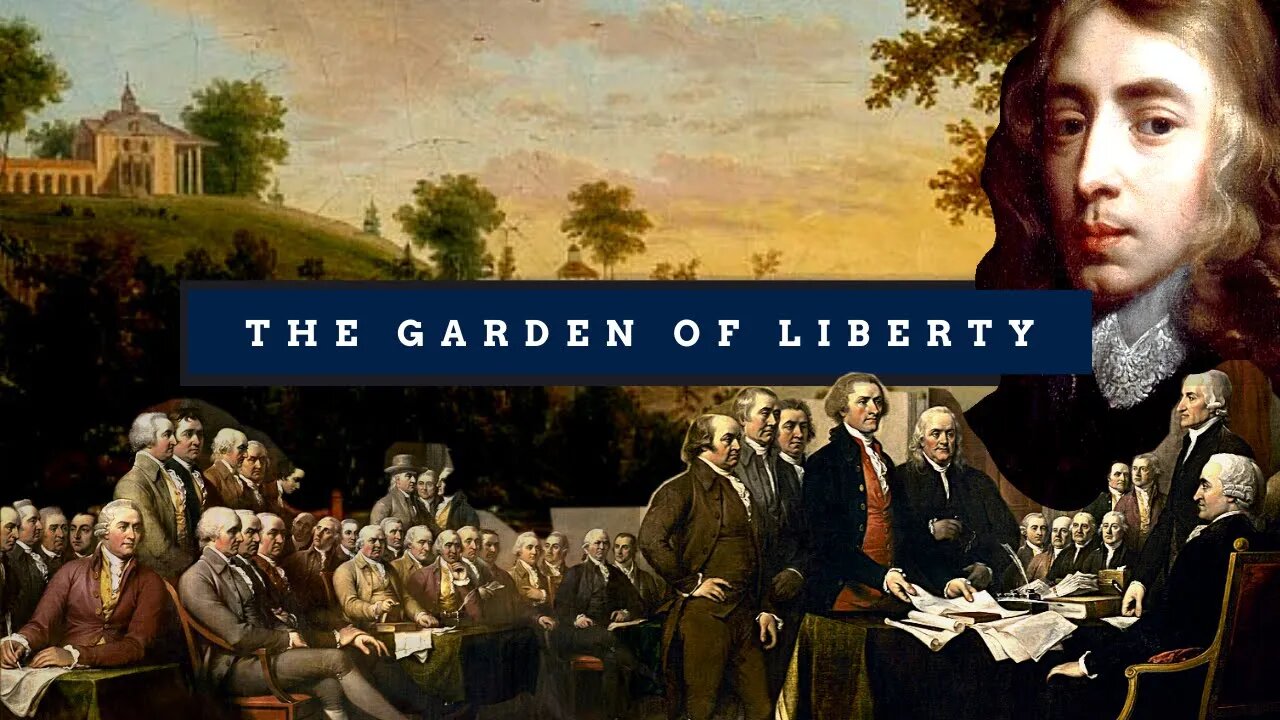Premium Only Content

The Garden of Liberty | A Symbol of Revolution (Milton, the English Civil War & American Revolution)
In honor of July 4th, I thought I’d make a Revolutionary video. We begin with the English Civil War, in which the writer and poet John Milton played an important part in the cause of the Common Wealth of England by defending principles of liberty, popular sovereignty, and limited government. But it was his greatest work, Paradise Lost, that had perhaps the most powerful ongoing political influence. Attempting to tell the story of the world in microcosm, Milton’s epic of the fall of man makes liberty fundamental to human nature.
A century later Milton’s writings, the drama of the garden of Eden not least among them, would go on to influence colonial Americans, including the philosophy of American founders such as Adams, Jefferson, Madison, who along with George Washington were all (surprisingly?) avid gardeners in their personal lives and strong advocates of agriculture in their political lives.
As a symbol, the liberalism of the Original Garden meant that colonial cries for liberty were not merely the pangs of discontents, but the outworking of the grand cosmic story. Milton establishes the agenda of liberty not just in an adolescent desire to do whatever one wants, but firmly within the framework of the grand meta-narrative of mankind.
As a pragmatic instrument, the garden proved itself to be essential in securing the external conditions of a liberal society. If we want to understand free societies, how they work, and how they can CONTINUE to work, we have to look to the garden, symbolically and practically.
SOCIAL MEDIA LINKS
Instagram: https://www.instagram.com/empire_of_the_mind/
Facebook: https://www.facebook.com/Empire-of-the-Mind-102111168633434/
Patreon: https://www.patreon.com/EmpireoftheMind
Email: theempireofthemind@gmail.com
VIDEOS MENTIONED IN THIS ESSAY
The Garden of Man
https://www.youtube.com/watch?v=DkOI2K_Bh4I&ab_channel=EmpireoftheMind
Hell and Heaven Within Us | Paradise Lost & John Milton's Metaphysical Philosophy of Happiness
https://www.youtube.com/watch?v=DwYsi7bpJak&ab_channel=EmpireoftheMind
A LAZY, NON-FORMATTED BIBLIOGRAPHY
BOOKS
John Adams: Revolutionary Writings, 1775-1783 edited by Wood
John Milton: Complete Poems and Major Prose edited by Hughs
Thomas Jefferson’s Garden Book annotated by Betts
Thomas Jefferson: Writings edited by Peterson
Founding Gardeners: The Revolutionary Generation, Nature, and the Shaping of the American Nation by Andrea Wulf
Oxford Handbook of Milton, edited by McDowell and Smith
Walt Whitman: Poetry and Prose edited by Kaplan
WEBSITES
Revolution
Wilson, A. 2019. Revolution. In The Cambridge Encyclopedia of Anthropology (eds) F. Stein, S. Lazar, M. Candea, H. Diemberger, J. Robbins, A. Sanchez & R. Stasch. http://doi.org/10.29164/19rev
https://www.anthroencyclopedia.com/entry/revolution
Revolution Classical And Christian Conceptions
https://science.jrank.org/pages/11147/Revolution-Classical-Christian-Conceptions.html
American Revolution
Two Founders, One Book
https://exhibits.stanford.edu/american-enlightenment/feature/two-founders-one-book
Tanner, John S., and Justin Collings. "How Adams and Jefferson Read Milton and Milton Read Them." Milton Quarterly 40, no. 3 (2006): 207-19. Accessed June 28, 2021. http://www.jstor.org/stable/24465010.
https://www.jstor.org/stable/24465010
(Re) Reading Milton
https://onlinelibrary.wiley.com/doi/abs/10.1111/j.1094-348X.1998.tb00596.x
Milton
Lewalski, Barbara Kiefer. ""PARADISE LOST" AND MILTON'S POLITICS." Milton Studies 38 (2000): 141-68. http://www.jstor.org/stable/26395791.
-
 17:50
17:50
Empire of the Mind
2 years agoDUNE Is A Physical, Spiritual Experience | Why It Was ART in IMAX but DISAPPOINTING on HBO Max
75 -
![[F EM UP Friday] Take # 2 [Destiny 2] Lets Kick Some A$$! #RumbleTakeOver](https://1a-1791.com/video/s8/1/c/W/7/1/cW71u.0kob-small-F-EM-UP-Friday-Take-2-Desti.jpg) 5:16:50
5:16:50
CHiLi XDD
7 hours ago[F EM UP Friday] Take # 2 [Destiny 2] Lets Kick Some A$$! #RumbleTakeOver
33.1K1 -
 5:13:43
5:13:43
ItsMossy
13 hours agoHALO WITH THE RUMBLERS (: #RUMBLETAKEOVER
29.7K1 -
 1:54:08
1:54:08
INFILTRATION85
7 hours agoHi, I'm INFILTRATION
31.7K9 -
 7:51:03
7:51:03
GuardianRUBY
8 hours agoRumble Takeover! The Rumblings are strong
61.8K2 -
 4:28:45
4:28:45
Etheraeon
16 hours agoWorld of Warcraft: Classic | Fresh Level 1 Druid | 500 Follower Goal
45.5K -
 3:17:21
3:17:21
VapinGamers
8 hours ago $3.60 earned🎮🔥Scrollin’ and Trollin’: ESO Adventures Unleashed!
31.2K2 -
 LIVE
LIVE
a12cat34dog
9 hours agoGETTING AFTERMATH COMPLETED :: Call of Duty: Black Ops 6 :: ZOMBIES CAMO GRIND w/Bubba {18+}
285 watching -
 8:23:18
8:23:18
NubesALot
12 hours ago $5.12 earnedDark Souls Remastered and party games
27.9K -
 3:03:42
3:03:42
GamersErr0r
23 hours ago $2.14 earnedits not what you think
22.9K1